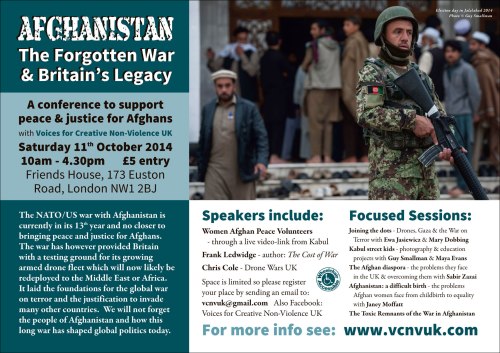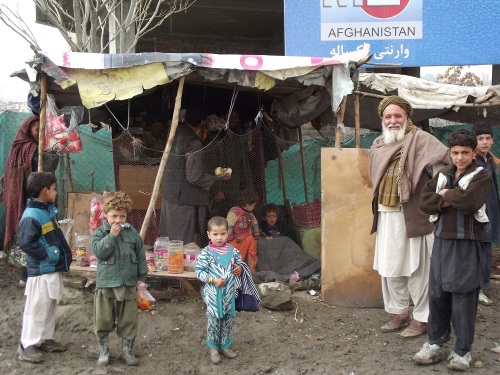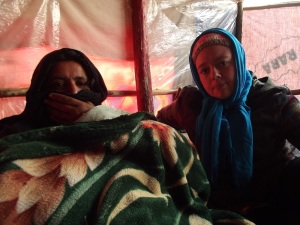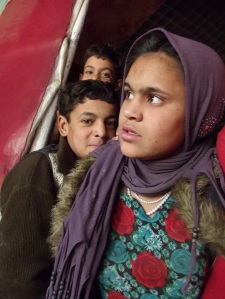A day conference to support peace and justice for Afghans
11th October 2014, Friends House 10am-4pm
Hosted and facilitated by Maya and Farzana
SPEAKERS
Andy Garrity – The Toxic Ramifications of War Project
On the 30th of September 2104 the Afghan Government signed a bilateral security agreement with ISAF and the Status of Forces Agreement with NATO, which dictate the role of ISAF in Afghanistan beyond 2014.
The Toxic Remnants of War Project was launched to consider and quantify the detrimental impact of military activities and materials on the environment and human health. As part of this process, the project is also reviewing gaps in existing state obligations for reducing the humanitarian and environmental harm from military-origin toxics, and examining parallel systems of protection based on environmental and human rights law and peacetime regulatory frameworks.
Andy Garrity will describe the environmental footprints of ISAF and NATO including what they are leaving behind through the closure of bases and firing ranges, as well as the waste disposal practises that pose a serious threat to civilian health.
Chris Cole- Drone Wars UK
Chris Cole is a tireless investigative campaigner, he will be outlining the case against drones from his research into the use of British military drones in Afghanistan and the environment of official secrecy and obfuscation. Over the past couple of months we have witnessed drone strikes in at least seven countries: Afghanistan, Pakistan, Somalia, Palestine, Yemen, Egypt and Iraq – and its likely that Syria and Libya may soon join that list. Whether such strikes are being undertaken under the umbrella of a UN resolution or carefully-crafted secret memos, it’s becoming clearer that drones are indeed making it easier for our political leaders to opt to use lethal force rather than diplomatic or political solutions.
Afghanistan has been the testing ground for Britain’s growing drone arsenal bought from US and Israel. We will hear about the co-operation between these countries and the global significance of the use of drones by focusing on Afghanistan, the “drone capital” of the world.
Frank Ledwidge author of Investment in Blood: The True Cost of Britain’s Afghan War
Frank is a barrister and former British military officer, his book sent tidal waves as he pieces together the colossal human and financial cost of the war in Afghanistan for Afghans and British, and weighs up what it was all for. His devastating indictment of the utter, unanswerable folly of Britain’s military intervention in southern Afghanistan includes calculations such as: by 2020 the Afghan war will have cost British tax payers £40bn – enough to run 1,000 primary schools for 40 years or to recruit 1,000 nurses and pay for their entire careers.
Like many in Afghanistan, he wonders how successful we will be have been in leaving behind a better country than the one we entered in 2001.
With regard to the cost in lives, more British soldiers have died in Afghanistan than in any other counter-insurgency campaign overseas since the Boer war. Moreover there are hundreds of thousands of unnamed Afghan civilians caught up in the conflict. As Ledwidge points out, Britain makes no serious effort to count, let alone identify, the thousands of Pashtun people killed, maimed or displaced by the fighting.
Investment in Blood: The True Cost of Britain’s Afghan War has been described as “a masterpiece in miniature” by New Statesman.
Women from the Afghan Peace Volunteers in Kabul
The conference has been inspired by the Afghan Peace Volunteers who have a clear and independent analysis of what Afghans need and want for their country. Since forming in 2012 Voices for Creative Non-Violence UK has focused it work on supporting the Afghan Peace Volunteers grassroots activists who are based in Kabul. Our peace delegations involve staying with and learning from the group and their friends in the community. With the APV we have produced articles to reflecting the lives and perspectives of ordinary Afghans. This Skype connection will enable us to hear the inspiring women Afghan peace activists who have chosen to reject the status quo of violence and look for alternative solutions for their war torn country.
There will be an opportunity to address questions to the women who will speak about the impacts of war and what is needed for Afghan women to secure better rights.
Focused Sessions
Building Afghan Peace
A workshop facilitated by Afghan community organiser Sabir Zazai who works with asylum seekers in Coventry. It is likely that Dari will be the main language spoken as the workshop will talk live with men and women in from the Afghan Peace Volunteers. They will make a case for the importance and value of international Afghan solidarity.
Sabir will also speak about his experiences and insights as an Afghan community organiser in the UK, the problems Afghans face here, the recent fallout following the Afghan elections and how we can work as a united movement to support the non-violence campaign in Afghanistan. The session will provide a foundation for future campaigning and perhaps start a coalition of activists wanting to work on what can be done in the future.
Perspectives of Kabul Street Children
Photojournalist Guy Smallman will talk about the Street Angels Project which he worked on with Azim Fakri, a Kabul based artist who has long viewed the children working on the streets on his home city with a heavy heart. Doing menial and often dangerous work, the children are robbed of their childhoods and dignity by crushing poverty. Guy and Azim are working together to raise awareness about the plight of the children, not by telling their stories for them, but by empowering them to tell us themselves. Guy will talk about the pilot project they ran in Spring when they worked with five street children to teach them the basics of photography and issue them with disposable cameras. The result is an exhibition showing the underbelly of Kabul through the eyes of its street children. Their photography shines a light on the people living on the margins as well as showing off their own skill and ability to learn. The project has proved that street children possess just as much talent and potential as any other child regardless of their circumstances.
The Challenges for Afghan Women
When Britain backed war with Afghanistan in 2001 we heard from our politicians that the international community would not turn its back on the plight of Afghan women. Thirteen long and bloody years later we will hear from Afghan women about their lives today and the challenges they face. The workshop will include testimonies from Farzana and Yagana, two Afghan women who have recently made their way to the UK after fleeing for their lives from Afghanistan.
Participants will see the premier showing of “Afghanistan: A Difficult Birth”, a short documentary by Janey Moffatt who made the film while visiting Kabul last year on a VCNV delegation. Her unique footage records the difficulties Afghan women face from childbirth, to equality.
Joining the Dots – Drones, Gaza and the War on Terror
With investigative journalist and campaigner Ewa Jasiewicz and VCNVUK’s Maya Evans, both of whom visited Kabul and the APV earlier this year.
Ewa and Maya aim to make the connections between all the factors which are making these wars possible, linking the common causes and drivers, and attempt to join the dots to link peace campaigners together in a combined effort.
They will explore how the arms industry is enriched by lucrative government contracts which is fuelling the wars on terror; how Britain’s drone arsenal was purchased from the Americans, how Britain uses Israeli drone technology and tests it on Afghanistan and how British drones will likely be used against Iraq and across the wider Middle East.
Ewa Jasiewicz spent 9 nine months in Iraq during 2003 and has visited Gaza and the West Bank several times. Both Ewa and Maya are very active in the anti-arms campaigners. In August this year they participated in a rooftop occupation the of UAV Engines Ltd which shut down the Israeli owned factory in the Midlands for 2 days.
WHAT NEXT?
At last year’s conference we launched the campaign action Fly Kites Not Drones, inspired from the testimonies of Afghan children who are too frightened to participate in kite flying because of the fear of drones which also favour the conditions of clear blue skies. The Fly Kites Not Drones actions at Afghan New Year on the 21st March this year saw international participation from the US to Australia, Kabul to Cerdigion and across the UK with over 30 peace groups getting together to make and fly kites in solidarity with Afghan peace makers. The concept is now being made into an education resource pack to be used in British schools.
We encourage everyone to Fly Kites Not Drones again in 2015 and make it an even more widespread event as we reclaim our skies for fun and not war.
This conference will also help form campaigning ideas and strategies for the future.
2015 is the year to unite with Afghanistan and reclaim the power.
Register now: vcnvuk@gmail.com
FOOD
Friends House has a marvellous cafe with soup, sandwiches, hot drinks and snacks available. There is also the yummy possibilities of Drummond Street (near Euston Train station) which has loads of Indian cafes and tasty snack shops.







